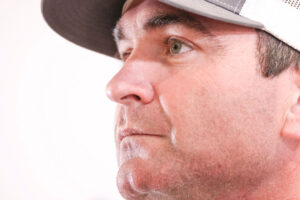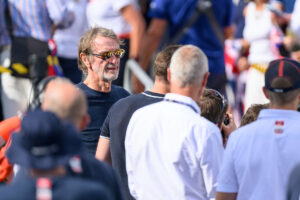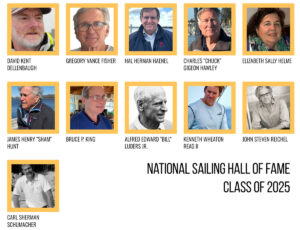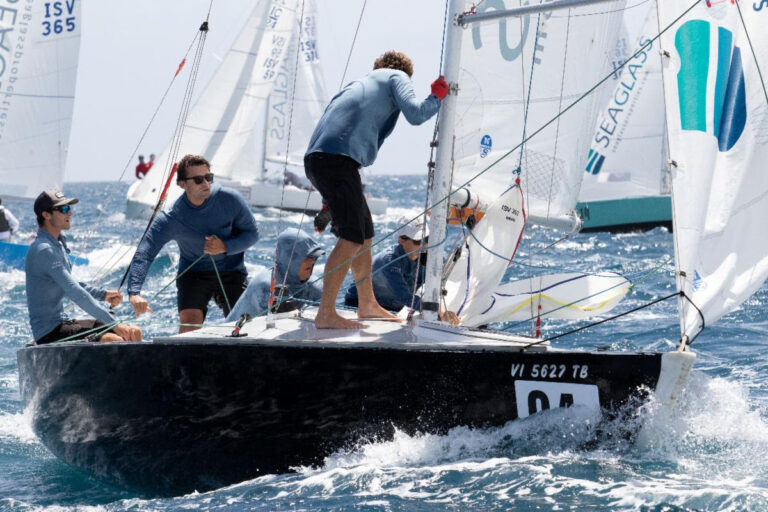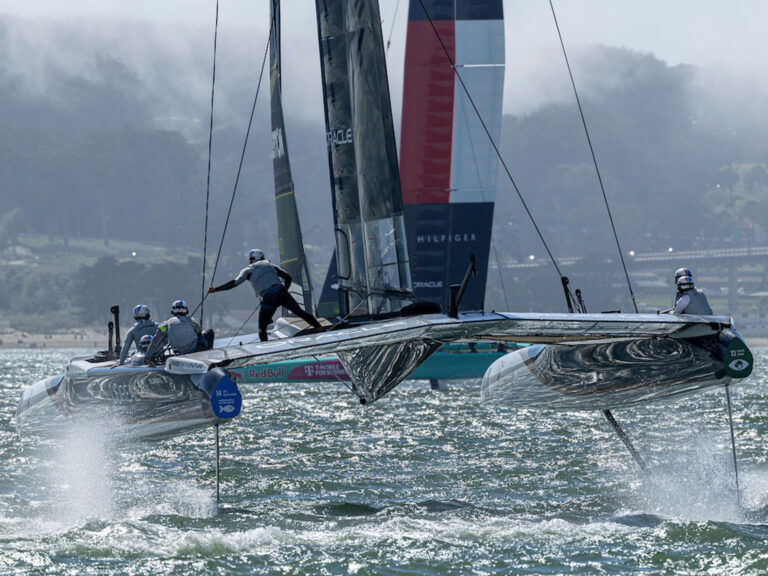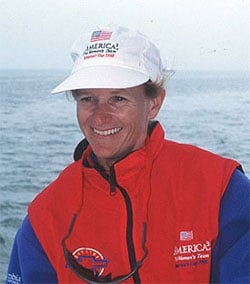
JJ Isler
You’ve steered a Transpac 52 and a Yngling earlier this year. Are you retired from serious campaigning or do you have something else up your sleeve: I have learned to never say never. I don’t know if it’s been a weakness or strength, but over my whole sailing career I’ll do a project and then I’ll quit sailing for a while. From a career standpoint it hasn’t been the smartest thing; you should keep racing once you’ve won a medal or done something with high visibility because that’s when people remember your name and the offers are rolling in to do neat projects. For me, for whatever reason, by the time I’ve finished a project I’ve put my heart and soul into I’m pretty burned out. I’ve always done this where I’ll sail a lot and then stop completely. But then the starting up again is always very humbling. For example? When Pease and I first got back in the 470 we flew down and did some regattas in Sydney; and I’d left a 4 month old baby at home. I was completely out of shape, and I remember standing waiting for the showers, talking with some Danish girl who said, “So, have you ever sailed a 470 before?” This was after a day when we could hardly get out of our own way. In this last Olympic campaign we definitely ran into more old friends who were race committee chairmen than sailors. At one point we went to this regatta in Croatia and you know we were a long way from home; it had been a long time on the road for a lot of teams. And I kept finding the other competitors would come up and ask me advice-one had a sore Achilles tendon and didn’t know what she should do. Another one was having stomach aches and was wondering if she should change her diet, and I thought “Why are these people all asking my advice?” Then I realized, “Oh no, they’re looking at me as their surrogate mom.” As a youth sailor, what or who was the key to you becoming successful as an adult? I don’t think 20 years ago I would’ve said this because I would’ve taken them for granted, but definitely my parents. They were always quietly in the background spending tons of their weekends driving me to various regattas. My dad spending hours out in the garage helping me sand the leeboard and rudder on my Sabot. Then, Dave Perry would come out and teach those CISA clinics. He definitely inspired me. I was so fortunate. I had Mark Reynolds and DeAnn as sailing instructors and then growing up in San Diego, Lowell North was always down there working on boats and going out racing, and Vince Brun and Dennis Conner and the Liberty guys were training when I was in high school. When I started qualifying for those womens world championships, which were in 420s, we didn’t have any west of the Mississippi, so Dave arranged that I flew out to the East Coast to sail with Nell Taylor in a 420. He also arranged for John Shadden and me to crew in Yale’s Snow and Satisfaction. Do you consider winning two Olympic medals your best accomplishments as a racer? I think so. To me the special thing about the Olympics is that everyone is focusing on that one event. It’s just amazing to go to an event where everyone you meet is the best their country has, whether you meet a badminton player or a heptathlete or a ping pong player. They’ve all been training for those two weeks. To go to that event-I know so many great sailors for whom the trials didn’t work out-I feel really lucky. Do you think you’re good at peaking at the right time? We definitely put it all together for the Olympics, but I don’t think I’ve always been a sailor who could do that. Otherwise I would’ve gone to the Olympics in 1988, too. In 2000, our medal was really special because we went into that Games without anyone thinking we had a shot at a medal. Something else that was really special in the days leading up to the last race was that most of our competitors came up to Pease and me and said, “We’re really rooting for you guys.” You’re the first woman elected to the Sailing World Hall of Fame. What other women would be at the top of your list to be members? From the Olympic ranks I know that what Barbara Kendall and Teresa Zabell have done is very impressive. Betsy Alison has also won a lot of championships. I think Pease Glaser is one of the best sailors on the planet, not just among women. Her ability to jump from Tornados to a Yngling to a Europe dinghy is amazing, both due to her versatility and her intellect. She is one of the smartest sailors-she learns the right lesson from each boat and learns what works, and combines that with an amazing seat-of-the-pants talent. You went from the Barcelona Olympics in 1992 to the cockpit of an America’s Cup boat. What was the hardest part of the shift as a competitor? I wish I had had another Cup in between where I could’ve been, say, the B team helmsman. To have had a chance to see how the organization and politics of a big team like that works and had a few more years to gain some maturity in making the transition from a 2-person boat to a 16-person boat. But it was an amazing experience. When I look at any of the successes I’ve had in big-boat sailing after that, with, say, getting to the semi-finals in the Brut Match Racing or steering Windquest to Boat of the Week at Key West, or racing a Transpac 52, it was all thanks to that year at America3 sailing university. When I started with America3, before I’d put wraps on the winch, I had to spin the winch a little bit to make sure I was loading it the right way. To me a J/24 was a big boat. When you lost your spot on Mighty Mary, how much did that hurt, and how do you feel about it now? A couple days later, Peter and I went for a walk, and I had Marly in one of those little back packs, and I said to Peter, “This is just the worst thing that’s ever happened to me.” I was crying, and then I started laughing, realizing, you know, it really was the worst thing that had ever happened to me. What an incredibly fortunate, easy life I’ve had-that the worst thing that’s ever happened to me was being benched. When I look back at it now, I learned a ton being taken off the A team. That last month of going out there as a backup person and putting in the hours, I learned so much about how to treat people and how to be a team player. After I got benched, Rod Davis sent me an e-mail and said, “Congratulations. You’ve joined a very elite list.” Rod was on it, Lowell North was on it-and you know the week I got benched, so did three other teams’ tacticians. For me personally, it was a great experience. And you know, I got to steer so many starts in the defender series. It was so much fun. And Bill Koch gave us a total, high-budget campaign. If we wanted a new sail, he bought a new sail. He wasn’t scrimping and saving and just putting on a good PR front. He really gave us all the tools we needed to improve. It was a really special opportunity. You and your husband each have a great racing record. What’s it like when you race together? The tone of voice that he uses to give information is the tone of voice he uses when he’s angry at something I’ve done. It’s this very serious tone and for some reason it evokes an emotional response. We have a hard time sailing together. So you don’t do it too often. No. We have fun racing against each other; in fact we did it in Key West. When you asked before who my role models were in my youth, obviously I didn’t meet Peter until I was all of 18, but he has been incredibly supportive of my sailing. There are a couple of years when I’ve broken even with sailing. But even with America3, my salary went to pay a nanny to look after Marly. So that was one of the years I broke even, and I think one or two Olympic years we were able to raise enough to break even, but besides that, all of my sailing has been a pretty big financial hit on the family. And then I think what if we’d bought a little waterfront condo [in San Diego] instead oh well. Anyway, he’s always been the first one who, whatever crazy idea I come up with, says “That sounds great, if you really want to do it, go for it.” And for the same reason we can’t really sail together, he’s never been a hands-on day-to-day coach, but with all my sailing, he’s always in the background watching the campaign progress. There have been a lot of times that he’s nudged us on a certain path that has made all the difference. He’s been a great advisor. If you could only race in one type of boat in one kind of sailing weather, what would it be? What’s your absolute favorite? I have the typical problem of many sailors-I have a limited memory- but when I think of heavy-air regattas in the 470 my knees start to ache so I don’t think I’d pick that. Sailing the TP 52s last January in over 18 knots of breeze-and Key West wasn’t that warm but if you could warm it up 20 degrees so you could wear a t-shirt and shorts and be blasting downwind in a Transpac 52-that would be pretty fun. Sounds like the second half of the Transpac. I don’t know. I’ve never been much of an offshore person. Can we just like drop in for the last day of the Transpac, so I can be there for the mai tais and great food when we get there? So do you have any advice for young sailors who want to succeed? This is pretty mundane, but it seems like you’ve got to find the right boat-there are so many out there. If you find yourself getting a little burned out, make sure you’re in the right boat for your size and skills and what you like to do. I wasted some time as a kid trying to sail a Laser. I was just too small, and then the problem is you start thinking you can’t compete equally. Find the boat, and find what you’re best at. That doesn’t mean if you have weaknesses you don’t have to find the training program to turn them into strengths. My other advice is that if you find something you love doing, don’t sell yourself short and give it up just because you think it won’t pay the bills.

